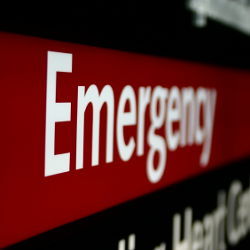
Veroniche
Western Region, US
Female, 54
I’ve been an ER nurse manager since 2009. Previously, I spent 24 yrs as an ER nurse. My hospital, a Level III trauma center, sees 70,000+ ER patients/yr. My responsibilities include billing, federal/state regulation oversight, metrics reporting, software education of e-records, and hiring/termination/disciplinary actions. The ER is one of the key impacted areas of healthcare reform. It’s a scary and exciting time for us, not just in the care of patients, but what the future holds for healthcare.
I don't know if I have any demographics to give you since the description of a hypochondriac is pretty subjective. These are just my opinions and observations here, to make it clear. I think a lot of people who some would describe as a hypochondriac have undiagnosed depression or anxiety disorder. I have seen patients who are convinced that they have cancer, or some type of serious illness, maybe the "disease of the week" you would see in the news media. Despite all of the diagnostic tests, etc, the person is not convinced they are not sick. I have seen a lot of elderly who seem to be obsessed with their state of health, and sometimes I think they are depressed and lonely. We had one patient who would come to the ER almost weekly with some thing or another that he thought was wrong with him. He actually had significant health problems, like heart disease and emphysema, but the reasons he would come to the ER weren't really related to this. One day he actually said to the staff that he came to the ER because we were the only people he considered his friends. He had no family in the area and lived like a recluse. The ER sees a big number of patients that we would call "frequent flyers". Some of them come to the ER for minor things, some are seeking prescription drugs, some have no social support, some are victims of unrecognized domestic abuse and see the ER as a safe place., many have substance abuse problems. It is easy to get callous with these folks, and roll our eyes and say "here they are again." There is usually a really complicated back story around them, and we don't often get to see it. The demographic is really all over the place--men/women, young/old, poor/wealthy. The most common thing is a really dysfunctional personal life, if we get to find that out in the course of their visit.
Sure, I would be happy to help, I will email you
That is not an easy question to answer. There are many factors that determine the cost of an ER visit. Each ER has a system to calculate the charge (called the facility level charge). This method of billing comes from the government. A level 1 charge could be something as easy as a medication refill, or stitches being removed, up to a level 5, which is usually a complex medical condition with or without admission. There is also a level of charging called critical care, above a level 5 charge. So for a simple ER visit such as a sore throat, ear ache or cold, which would just require an exam, possiblly a prescription and then discharge, that generally would be a level 2. In our facility, a level 2 charge is about $500. That does not include the bill you would receive from the physician, which could be another $150. If you are uninsured, the hospital will give you a discount of about 40%, bringing the level charge down to about $300. If your chief complaint (why you came to the ER) is more complicated, and you have tests such as lab or x ray done, the level charge will increase according to those factors. Alevel 5 charge in our ER is over $2500 and that does not include the costs of medications, lab or radiology testing that is done. Of course, every hospital has different charges for different levels, so you may be charged more in a different city or state. The government does not set prices. Just an aside, we have patients who come into the ER and they exaggerate why they are coming just in order to bump the line. For example, most folks know that people with heart attack symptoms will be seen faster than those with an ear ache. However, once you say that you are having chest pain (even if you are making that up in order to see a doctor faster), the physician is obligated to make sure that you are not having a life threatening emergency such as a heart attack or a blood clot in the lung, or pneumonia, etc. You will be charged for the complexity of your care and how much it takes for the physician to determine whether you have an emergency medical condition or not. Be honest, tell the physician all of your symptoms and your concerns. If you minimize your symptoms in order to save money, you run the risk of the physician missing something important. If you exaggerate with the express purpose of getting in faster, you will pay with your pocketbook, and might impede the care of someone who is truly ill.
Honestly, I don't know of any ER doc who left that profession to become a nurse, so I can't really answer that. Or any type of doctor, for that matter. Other than the instance I mentioned in a previous post, I have also never seen an ER doc do the tasks that traditionally fall to the nurses or the techs. I wouldn't get annoyed, but I wonder what was up. We have great professional relationships with the ER docs, but usually they come and get us if a patient needs something, instead of getting it themselves. For example, if a patient asked for a blanket, the doc will go find the nurse, and then he or she will go get the blanket. The patient just wants a blanket for heaven's sake, just go get one.
Dry Cleaner
 Why don't more dry cleaners stay open late?
Why don't more dry cleaners stay open late?
Call Center Employee (Retail)
 When do your policies allow you to hang up on a rude caller?
When do your policies allow you to hang up on a rude caller?
Chef
 Is it true that the "specials" are usually the stuff that's been sitting around awhile?
Is it true that the "specials" are usually the stuff that's been sitting around awhile?
I have never seen that in the ERs that I have worked. However,the staff get hit on by a lot of patients, especially if the patients are intoxicated. Where I am working right now, a patient has been stalking a nurse, showing up at the ER saying he has a date with her and getting really upset if they don't let him in (the ER is a locked unit). She has called the local police but they have said unless he threatens her there is nothing she can do. So she walks out to her car with security and keeps a close eye out. I have seen a lot of involvement between staff, affairs between married employees, sex in a closed office between employees, stuff like that. Two of the staff were having an affair, and one of the spouses would come to the ER trying to find the other spouse, lots of Jerry Springer drama. That is so frustrating as a manager. Be professional, people! I don't want to know who you are sleeping with, especially when it is another employee.
I have not seen this in my current ER. In a previous ER in the early 90's I remember a patient who was diagnosed with this. She was seen on camera (while she was a patient in the hospital) injecting fecal material under her skin, mostly on her legs. We saw her in the ER for repeated infections. I don't know what eventually happened to her. Moms who make their kids sick is called Munchausen by Proxy. I have only heard about this, and have not personally seen it. So sad
Generally speaking, there are not dentists in the Emergency Department. Some ED's may have dentists on call that they can refer a patient to for a dental emergency, but dentists do not come to the ED, at least in our area. Our ED does have limited on call oral surgeons for dental trauma, but they are not on call every day 24/7. Most of the oral surgeons do not come in to the ED but ask us to send the patient to their office. The ED doc can treat for dental pain with dental blocks (like Novacaine), or infection with antibiotics, but they cannot reimplant teeth. In our ED we have a list of nearby dental clinics that will take uninsured patients on a sliding scale fee schedule that we refer to for general dental problems. In 2012, our ED treated over 800 patients with dental problems, about 1% of our total volume.
-OR-
 Login with Facebook
Login with Facebook (max 20 characters - letters, numbers, and underscores only. Note that your username is private, and you have the option to choose an alias when asking questions or hosting a Q&A.)
(A valid e-mail address is required. Your e-mail will not be shared with anyone.)
(min 5 characters)
By checking this box, you acknowledge that you have read and agree to Jobstr.com’s Terms and Privacy Policy.
-OR-
 Register with Facebook
Register with Facebook(Don't worry: you'll be able to choose an alias when asking questions or hosting a Q&A.)